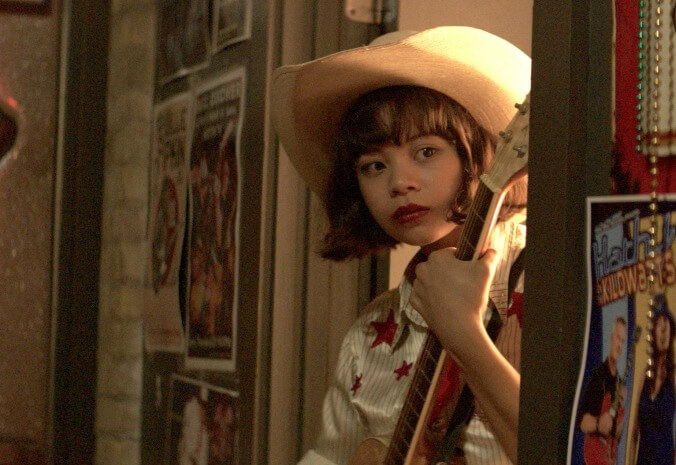At the start of
Yellow Rose, 17-year-old Filipino American Rosario “Rose” Garcia (Eva Noblezada) doesn’t seem all that different from your average Texan teen. An aspiring singer-songwriter with a love of country music, she’s whiling away the summer half-heartedly studying for her SATs and milling about home, which for her is a motel just outside Austin, where her widowed mother, Priscilla (Princess Punzalan), works as a cleaner. When Rose is refused permission to go to a downtown honky tonk called The Broken Spoke, she does so anyway, under the guise of attending a church event with Elliot (Liam Booth), an acquaintance and mutual crush. Though she’s initially nervous about getting in the bar with a fake ID—and ends up drinking way,
way too much—the evening goes off without a hitch. But when she and Elliot drive back to her motel room long past curfew, they arrive to the sight of an Immigration and Customs Enforcement (ICE) raid. Rose gets home just in time to see her mom being taken away.
This juxtaposition of underage drinking (i.e., run-of-the-mill adolescent illegality) with the plight of undocumented immigrants is none too subtle. But apart from being characteristic of Yellow Rose as a whole, the tonal whiplash it creates also reflects the emotional turmoil of its headstrong heroine. Writer-director Diane Paragas has chosen an incredibly hot-button topic for her feature debut, and the film isn’t free of manipulative, stakes-raising contrivances. Not long after Rose starts living at The Broken Spoke, courtesy of kindly owner Jolene (Libby Villari), there’s an ICE raid on the bar; fellow “illegal” Jose (Gustavo Gomez), whose parents had already been deported, is taken away. But Rose, who comes face-to-face with a visibly nervous, green-looking agent, is spared. Later, when mother and daughter are able to see each other again, and Priscilla talks about her dire living conditions, we get a close-up of an ICE guard’s neck twitching in agitation. Yet another instance of glibly “humanizing” detail, it merely intensifies the cruelty when the meeting is cut short.
Perhaps counterintuitively, Yellow Rose works better when it addresses its fraught subject matter more obliquely, focusing instead on Rose’s resourceful, willful attempts to survive on her own. It’s to the film’s benefit that Paragas and her co-screenwriters refuse to sand down their protagonist’s more exasperating qualities. Rose is justifiably confrontational with her estranged aunt Gail (legendary singer and actress Lea Salonga, in little more than a cameo), whom she discovers has been living in relative ease so close to her all along. But even to those who give her nothing but support, such as local country musician Dale Watson—who houses her and even helps her produce a demo of some original songs—she can still be unreasonable, selfish, and altogether immature. This isn’t to say that Paragas doesn’t acknowledge the anguish of Rose’s extraordinarily trying predicament; not even of age yet, she’s essentially forced to choose between her mother, who faces deportation, and the country she now calls home. But the film also understands the extent to which this choice is, particularly for a young person still figuring things out, not so easily separated from professional ambition and a desire for independence.
So it’s unfortunate that this acute understanding of Rose’s personal conflict doesn’t really translate to the film as a whole. Noblezada, best known for her Tony-nominated turn in Miss Saigon (in the very role that Salonga originated), is a superb singer and able performer, and as Rose, she holds her own opposite Watson, whom she takes the stage with a few times across the film. But apart from being saddled with some clumsy lines—“I’ve got some shit to express!” Rose says, after visiting her mother in an ICE detention center no less—the actor is poorly served by Paragas’ at-best functional filmmaking. Rather than allow scenes to play out organically, the director tends to cut them up into a jittery progression of heavily underlined gestures and dialogue. And for a film that should be defined by its situational specificity, Yellow Rose has a curious tendency to skate around the details. Still, the film ends on a suitably bittersweet moment for Rose, observing as she charts her own course, even at the risk of failure. Yellow Rose may not be a success on the whole, but it does suggest that Paragas, like her protagonist, is still finding her way.

